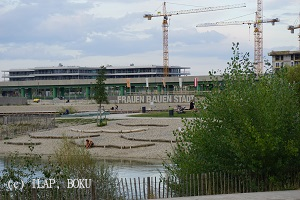The international working group "Gender- and Climate-just Cities and Urban Regions" (leadership Prof. Doris Damyanovic (University of Natural Resources and Applied Life Sciences Vienna) and Prof. Ulrike Sturm (Lucerne University of Applied Sciences and Arts)) met on March 3-4, 2021 for the first time. Aim was to concretize the basic questions and goals for the working group. Over the next three years, the committee of experts from planning science and planning practice will address challenges, concepts and goals for a climate and social-just urban and regional development. In addition to the leaders, the working group has the following members: Nataša Čolić, Institute of Architecture and Urban & Spatial Planning of Serbia, Belgrade, Serbia; Dr. Cédric Duchêne-Lacroix, University Basel Department of Social Sciences; Dr. Christian Dymén, TRIVEKTOR Traffic, Lund (Sweden); Inés Novella Abril, Universidad Politécnica de Madrid, Spain; Dr. Ana Pajvančić-Cizelj, University of Novi Sad, Serbia; Prof. Dr. Petra Schneider, Magdeburg-Stendal University of Applied Sciences, Germany; Prof. Lenka Slavíková, IEEP, Institut pro ekonomickou a ekologickou politiku, Usti nad Labem, Czech Republic; Meike Spitzner, Wuppertal Institute, Germany; Jeff Turner, University of Leeds, England; Prof. Dr. Brigitte Wotha, BfSR - Office for Urban and Regional Development. Franziska Städler (HS Luzern) and Roswitha Weichselbaumer (BOKU Vienna) support the AK as executive members.

 The international working group (IAK) "gender and climate just cities and urban regions" focused on questions of gender-oriented and climate-related urban planning on 16 and 17. Sept. 2021 in Vienna. An impulse from Eva Prangerl ("Smart City Team" of the City of Vienna) enhanced the discussion on the conflicting issues of climate neutrality, participation and gender justice in urban development. And with examples from Serbia, England, Spain, Sweden and Germany, the members of the working group shaped the discussion on gender-sensitive planning and spatial development from their own perspectives. During excursions around one of the largest urban development sites of Europe, the "Seestadt Aspern" (pic) and the inner-city 10th district of Vienna, the group discussed on site what challenges and prospects integrated urban development can offer, and how to create and maintain vibrant neighborhoods. Peter Hinterkörner („3420 aspern development AG“) outlined key issues for social coexistence and gender- and climate-responsive planning approaches in the "Seestadt".
The international working group (IAK) "gender and climate just cities and urban regions" focused on questions of gender-oriented and climate-related urban planning on 16 and 17. Sept. 2021 in Vienna. An impulse from Eva Prangerl ("Smart City Team" of the City of Vienna) enhanced the discussion on the conflicting issues of climate neutrality, participation and gender justice in urban development. And with examples from Serbia, England, Spain, Sweden and Germany, the members of the working group shaped the discussion on gender-sensitive planning and spatial development from their own perspectives. During excursions around one of the largest urban development sites of Europe, the "Seestadt Aspern" (pic) and the inner-city 10th district of Vienna, the group discussed on site what challenges and prospects integrated urban development can offer, and how to create and maintain vibrant neighborhoods. Peter Hinterkörner („3420 aspern development AG“) outlined key issues for social coexistence and gender- and climate-responsive planning approaches in the "Seestadt".

